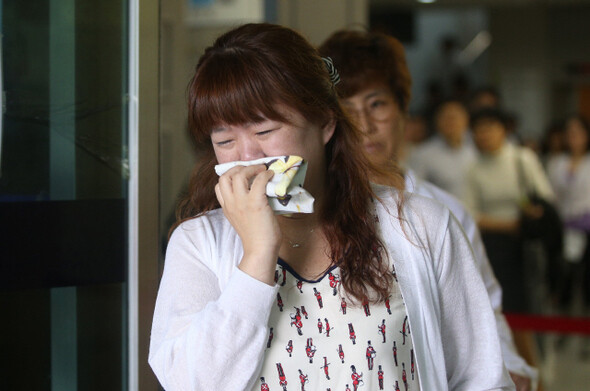hankyoreh
Links to other country sites 다른 나라 사이트 링크
Another court recognizes Samsung’s complicity in leukemia cases

By Kim Min-kyung and Lee Jung-ae, staff reporters
Yet another court ruling has found that former Samsung Electronics semiconductor plant workers with leukemia were victims of industrial accidents.
The reasoning is that the workers were exposed through their workplace to benzene and ionizing radiation, both of which are linked to the disease. The latest ruling adds to the list of courts coming to the opposite conclusion from Samsung, which denies any causal relationship between the workplace environment and leukemia. The next question is how the judgments will impact negotiations currently under way between the company and victims‘ rights watchdog Banollim.
The ninth civil division of Seoul High Court, under judge Lee Jong-seok, ruled on Aug. 21 that the leukemia that claimed the lives of former Samsung Electronic semiconductor plant workers Hwang Yu-mi and Lee Sook-young constituted an industrial accident.
Hwang and Lee’s family members had filed the suit against the Korea Workers‘ Compensation and Welfare Service (K-Comwel) to demand the overturning of a decision not to pay them the victims’ lost wages and funeral expenses.
At the same time, the court did not recognize a causal relationship between the workplace and the diseases that took the lives of Hwang Min-woong and two other workers whose family members filed suit.
In each case, the court upheld the ruling from the first trial.
In the cases of Lee and Hwang Yu-mi, the court acknowledged that they had been exposed to benzene and ionizing radiation, both known causes of leukemia.
“It appears that some of the wafers [thin plates used for semiconductor production] provided in their cleaning work did not have the benzene-containing sensitizer removed,” the court said, adding that there was a “possibility of exposure to ionizing radiation during periodic visits to other bays.”
The court also acknowledged the possibility of “partial exposure to harmful substances” for the three other victims, but did not recognize their diseases as industrial accidents.
“It is difficult to establish a correlation between the chemicals that they personally handled and the diseases that they suffered,” it said in its ruling.
Banollim welcomed the ruling for Hwang and Lee in a statement issued afterwards.
“Given that over 70 people have suffered severe lymphatic and hematopoeic diseases such as leukemia at Samsung semiconductor plants alone, this ruling will hopefully open a way for other victims to have their conditions recognized as industrial accidents,” the group said.
But the group also protested the decision not to recognize industrial accidents for the three other victims.
“The court did not take into account the characteristics of the semiconductor-making process, where one may be exposed to any combination of hundreds of harmful agents, and the difficulty in conclusively establishing harm,” it said, before going on to urge improvements to a legal system that puts the onus for determining an industrial accident on the worker.
The ruling may have an impact on the negotiations under way since May between Samsung Electronics and Banollim over occupational disease sufferers who have lost their lives and are fighting disease after working at semiconductor plants and other locations.
“What this proves is that workers may have been exposed to harmful chemicals,” said labor attorney Lee Jong-ran of Banollim.
“Samsung needs to acknowledge and apologize for the causal relationship between the factory working environment and leukemia,” she added.
Banollim believes the reason the three victims did not have their conditions recognized as industrial accidents is that Samsung did not disclose the list of chemicals used at its plant. Now it is expected to ramp up its calls for information disclosure on the materials currently handled by workers.
Samsung Electronics said it “respects the court‘s decision.”
“As the company has already pledged to apologize to the suffering family members, provide compensation, and undertake preventive efforts, we intend to work to resolve the matter quickly through negotiations,” it said.
Please direct questions or comments to [english@hani.co.kr]

Editorial・opinion
![[Column] Has Korea, too, crossed the Rubicon on China? [Column] Has Korea, too, crossed the Rubicon on China?](https://flexible.img.hani.co.kr/flexible/normal/500/300/imgdb/original/2024/0419/9317135153409185.jpg) [Column] Has Korea, too, crossed the Rubicon on China?
[Column] Has Korea, too, crossed the Rubicon on China?![[Correspondent’s column] In Japan’s alliance with US, echoes of its past alliances with UK [Correspondent’s column] In Japan’s alliance with US, echoes of its past alliances with UK](https://flexible.img.hani.co.kr/flexible/normal/500/300/imgdb/original/2024/0419/2317135166563519.jpg) [Correspondent’s column] In Japan’s alliance with US, echoes of its past alliances with UK
[Correspondent’s column] In Japan’s alliance with US, echoes of its past alliances with UK- [Editorial] Does Yoon think the Korean public is wrong?
- [Editorial] As it bolsters its alliance with US, Japan must be accountable for past
- [Guest essay] Amending the Constitution is Yoon’s key to leaving office in public’s good graces
- [Editorial] 10 years on, lessons of Sewol tragedy must never be forgotten
- [Column] A death blow to Korea’s prosecutor politics
- [Correspondent’s column] The US and the end of Japanese pacifism
- [Guest essay] How Korea turned its trainee doctors into monsters
- [Guest essay] As someone who helped forge Seoul-Moscow ties, their status today troubles me
Most viewed articles
- 1[Column] The clock is ticking for Korea’s first lady
- 2After 2 months of delayed, denied medical care, Koreans worry worst may be yet to come
- 3Samsung barricades office as unionized workers strike for better conditions
- 4[Column] Has Korea, too, crossed the Rubicon on China?
- 5[Correspondent’s column] In Japan’s alliance with US, echoes of its past alliances with UK
- 6Hong Se-hwa, voice for tolerance whose memoir of exile touched a chord, dies at 76
- 7All eyes on Xiaomi after it pulls off EV that Apple couldn’t
- 8US overtakes China as Korea’s top export market, prompting trade sanction jitters
- 9[Editorial] When the choice is kids or career, Korea will never overcome birth rate woes
- 10[Photo] Smile ambassador, you’re on camera